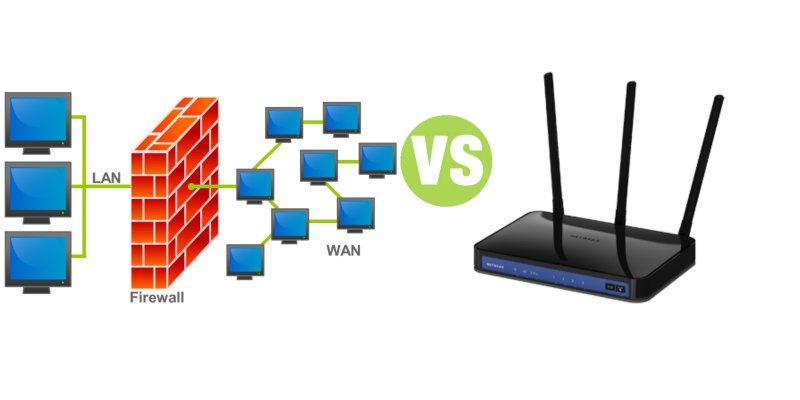Firewall vs Router
Summary: Difference Between Firewall and Router is that a firewall is hardware and/or software that protects a network’s resources from intrusion by users on another network such as the Internet. All networked and online computer users should implement a firewall solution. While a router is a communications device that connects multiple computers or other routers together and transmits data to its correct destination on a network. A router can be used on any size of network.

Firewall
A firewall is hardware and/or software that protects a network’s resources from intrusion by users on another network such as the Internet. All networked and online computer users should implement a firewall solution. Organizations use firewalls to protect network resources from outsiders and to restrict employees’ access to sensitive data such as payroll or personnel records. They can implement a firewall solution themselves or outsource their needs to a company specializing in providing firewall protection. Large organizations often route all their communications through a proxy server, which is a component of the firewall. A proxy server is a server outside the organization’s network that controls which communications pass into the organization’s network.
Home and small office/home office users often protect their computers with a personal firewall utility. A personal firewall is a utility program that detects and protects a personal computer and its data from unauthorized intrusions. Some operating systems, such as Windows, include personal firewalls. Some small office/home office users purchase a hardware firewall, such as a router or other device that has a built-in firewall, in addition to or instead of personal firewall software. Hardware firewalls stop intrusions before they attempt to affect your computer maliciously.
Router
A router is a communications device that connects multiple computers or other routers together and transmits data to its correct destination on a network. A router can be used on any size of network. On the largest scale, routers along the Internet backbone forward data packets to their destination using the fastest available path. For smaller business and home networks, a router allows multiple computers to share a single high-speed Internet connection such as a cable modem or DSL modem. These routers connect from 2 to 250 computers.
To prevent unauthorized users from accessing files and computers, many routers are protected by a built-in firewall, called a hardware firewall. Some also have built-in antivirus protection. Today’s routers or combination wireless access point/routers are easy to configure and secure against unauthorized access.
Also Read:
Difference Between Firewall and Antivirus
Difference Between Personal Firewall and Network Firewall
Difference Between VPN and Firewall
Difference Between Client Server Network and Peer to Peer Network







Leave a Comment
You must be logged in to post a comment.